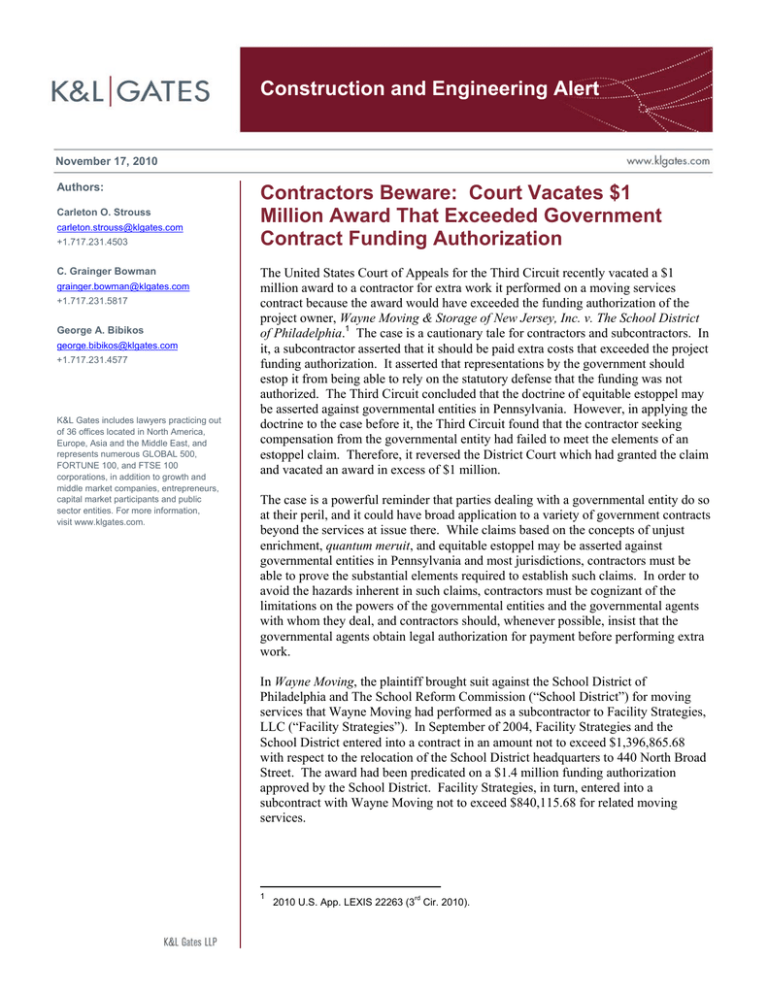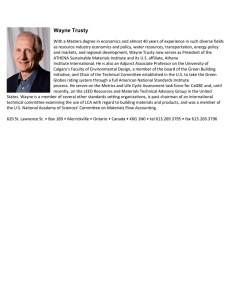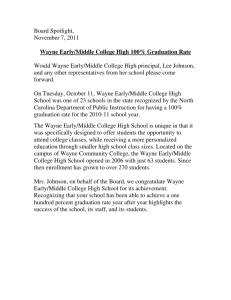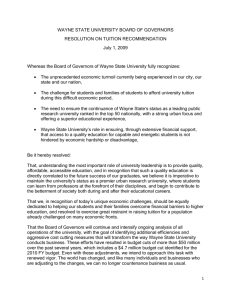
Construction and Engineering Alert
November 17, 2010
Authors:
Carleton O. Strouss
carleton.strouss@klgates.com
+1.717.231.4503
C. Grainger Bowman
grainger.bowman@klgates.com
+1.717.231.5817
George A. Bibikos
george.bibikos@klgates.com
+1.717.231.4577
K&L Gates includes lawyers practicing out
of 36 offices located in North America,
Europe, Asia and the Middle East, and
represents numerous GLOBAL 500,
FORTUNE 100, and FTSE 100
corporations, in addition to growth and
middle market companies, entrepreneurs,
capital market participants and public
sector entities. For more information,
visit www.klgates.com.
Contractors Beware: Court Vacates $1
Million Award That Exceeded Government
Contract Funding Authorization
The United States Court of Appeals for the Third Circuit recently vacated a $1
million award to a contractor for extra work it performed on a moving services
contract because the award would have exceeded the funding authorization of the
project owner, Wayne Moving & Storage of New Jersey, Inc. v. The School District
of Philadelphia.1 The case is a cautionary tale for contractors and subcontractors. In
it, a subcontractor asserted that it should be paid extra costs that exceeded the project
funding authorization. It asserted that representations by the government should
estop it from being able to rely on the statutory defense that the funding was not
authorized. The Third Circuit concluded that the doctrine of equitable estoppel may
be asserted against governmental entities in Pennsylvania. However, in applying the
doctrine to the case before it, the Third Circuit found that the contractor seeking
compensation from the governmental entity had failed to meet the elements of an
estoppel claim. Therefore, it reversed the District Court which had granted the claim
and vacated an award in excess of $1 million.
The case is a powerful reminder that parties dealing with a governmental entity do so
at their peril, and it could have broad application to a variety of government contracts
beyond the services at issue there. While claims based on the concepts of unjust
enrichment, quantum meruit, and equitable estoppel may be asserted against
governmental entities in Pennsylvania and most jurisdictions, contractors must be
able to prove the substantial elements required to establish such claims. In order to
avoid the hazards inherent in such claims, contractors must be cognizant of the
limitations on the powers of the governmental entities and the governmental agents
with whom they deal, and contractors should, whenever possible, insist that the
governmental agents obtain legal authorization for payment before performing extra
work.
In Wayne Moving, the plaintiff brought suit against the School District of
Philadelphia and The School Reform Commission (“School District”) for moving
services that Wayne Moving had performed as a subcontractor to Facility Strategies,
LLC (“Facility Strategies”). In September of 2004, Facility Strategies and the
School District entered into a contract in an amount not to exceed $1,396,865.68
with respect to the relocation of the School District headquarters to 440 North Broad
Street. The award had been predicated on a $1.4 million funding authorization
approved by the School District. Facility Strategies, in turn, entered into a
subcontract with Wayne Moving not to exceed $840,115.68 for related moving
services.
1
rd
2010 U.S. App. LEXIS 22263 (3 Cir. 2010).
Construction and Engineering Alert
The move to 440 North Broad Street encountered
numerous difficulties involving non-functioning
elevators, unanticipated work, and delays due to the
School District’s disputes with a third party.
According to testimony offered by Facility
Strategies, it sought assurance of additional
compensation from the School District for the
additional expenses, and the School District
represented that payment would be made if the costs
were documented. Also according to testimony
offered by Facility Strategies, the School District
exhorted Facility Strategies to get the job done on
schedule notwithstanding the difficulties.
After the work was completed, Facility Strategies
submitted invoices to the School District which
included $830,071.18 for additional expenses
incurred by Wayne Moving. The School District
refused to pay the additional expenses of Wayne
Moving, contending that the claimed amount would
cause total payments to exceed the $1.4 million
authorization by the School Reform Commission
which essentially was a cap on the amount that the
School District was authorized to spend on the
project. The School District asserted that Section
508 of the Pennsylvania Public School Code,2 which
requires authorization by school directors of any
contract expenditure in excess of $100, barred any
claim beyond the $1.4 million authorization.
The District Court rejected the School District’s
contention and held that, under the doctrine of
equitable estoppel, the School District was prevented
from raising the defense of §508 as a shield to
Wayne Moving’s claim. The District Court noted
that, under Pennsylvania law, the elements of
estoppel are: 1) misleading words, conduct, or
silence by the party against whom the estoppel is
asserted; 2) unambiguous proof of reasonable
reliance upon the misrepresentation by the party
asserting the estoppel; and 3) the lack of a duty to
inquire on the party asserting the estoppel. Applying
those elements to the evidence before it, the District
Court concluded that the School District was
estopped from asserting the defense of §508.3
The District Court next considered whether Wayne
Moving was entitled to payment on its unjust
enrichment claim. The District Court noted that, to
establish an unjust enrichment claim, the plaintiff
must show: 1) benefits conferred on defendant by
plaintiff; 2) appreciation of such benefits by the
defendant; and 3) acceptance and retention of such
benefit under such circumstances that it would be
inequitable for the defendant to retain the benefit
without payment of value. Again, the District Court
found that Wayne Moving had satisfied the
elements, holding that it would be inequitable for
the School District to retain the benefit of the
additional moving services under the
circumstances.4 The District Court entered a
judgment of $1,003,908.33 in favor of Wayne
Moving.
On appeal, the Third Circuit reversed the judgment
of the District Court and thereby vacated the award
to Wayne Moving. The Third Circuit began by
noting that §508 applied to both express written
contracts and implied contracts (the unjust
enrichment or quantum meruit award was based on
an implied in law contract since Wayne Moving did
not have an express contract directly with the
School District).5 It then considered whether
Wayne Moving had established the elements of
equitable estoppel in order to avoid the defense
asserted by the School District under §508.
Although the Third Circuit agreed that the District
Court had correctly stated the elements of equitable
estoppel, it disagreed with the District Court’s
analysis of the facts and denied equitable estoppel.
Rather, the Third Circuit concluded that the School
District had not misled Wayne Moving by words,
conduct or silence and that there was no
unambiguous proof that Wayne Moving had
reasonably relied on any such conduct by the School
District.
The Third Circuit noted that the representations, if
any, were essentially made to Facility Strategies
(not Wayne Moving). Further, it found the absence
of fundamental injustice since, according to the
Third Circuit, Facility Strategies was aware of the
limitations on the funding of its contract with the
2
24 P.S. §5-508.
Wayne Moving & Storage of New Jersey v. The School
District of Philadelphia, 2008 U.S. Dist. LEXIS 820 (E.D. Pa.
2008) at *24.
3
4
5
Id. at *26-*27.
Wayne Moving, 2010 U.S. App. LEXIS 22263 at *16.
November 2010
2
Construction and Engineering Alert
School District. Consequently, there was no
reasonable reliance by Facility Strategies on any
statements made by the School District, and any
reliance by Wayne Moving was based on the
directive to proceed that it received from Facility
Strategies, not based on the conduct of the School
District.6
Experienced legal counsel may be of substantial
assistance in improving the likelihood for a
successful outcome in these difficult situations.
Wayne Moving dramatically illustrates the risks
accepted by contractors and subcontractors who
continue to provide services for governmental
entities in the face of substantial additional costs for
which they will seek additional compensation.
Unfortunately, these circumstances frequently arise
(as they did in Wayne Moving) at a time when
substantial work is being performed (and cost is
being incurred) and when the cumbersome
governmental approval process may not move
quickly enough to obtain legally required
authorizations. Faced with these circumstances,
contractors and subcontractors encounter the
dilemma of proceeding with the work and risking
non-payment or refusing to proceed with the work
and suffering repercussions associated with alleged
liquidated damages or threats to prequalification
status or delay claims from other parties to the
project. In these circumstances, the contractor (or
subcontractor) should think this dilemma through,
and not just plunge forward expecting that it will be
paid for the extra work. The contractor may be able
to “improve the odds” through communications with
the governmental entity that either (1)
unambiguously demonstrate the entitlement to
payment, or (2) clearly justify the cessation of work
until appropriate payment authorization is provided.
“Written” communication is often the best way to
prove either or both of these alternatives.
Wayne Moving also illustrates a circumstance where
a contractor (and even more so a subcontractor) may
be subject to risks not necessarily apparent from the
contract documents. Here, the fundamental hazard
was the absence of a sufficiently large funding
authorization by the governmental entity.
Contractor representatives may be unaware of the
funding status of a project and whether certain
change orders, while ostensibly authorized, may not
ultimately result in payment.
6
Id. at *16 to *23.
November 2010
3
Construction and Engineering Alert
Anchorage Austin Beijing Berlin Boston Charlotte Chicago Dallas Dubai Fort Worth Frankfurt Harrisburg Hong Kong London
Los Angeles Miami Moscow Newark New York Orange County Palo Alto Paris Pittsburgh Portland Raleigh Research Triangle Park
San Diego San Francisco Seattle Shanghai Singapore Spokane/Coeur d’Alene Taipei Tokyo Warsaw
Washington, D.C.
K&L Gates includes lawyers practicing out of 36 offices located in North America, Europe, Asia and the Middle East, and represents numerous
GLOBAL 500, FORTUNE 100, and FTSE 100 corporations, in addition to growth and middle market companies, entrepreneurs, capital market
participants and public sector entities. For more information, visit www.klgates.com.
K&L Gates comprises multiple affiliated entities: a limited liability partnership with the full name K&L Gates LLP qualified in Delaware and
maintaining offices throughout the United States, in Berlin and Frankfurt, Germany, in Beijing (K&L Gates LLP Beijing Representative Office), in
Dubai, U.A.E., in Shanghai (K&L Gates LLP Shanghai Representative Office), in Tokyo, and in Singapore; a limited liability partnership (also named
K&L Gates LLP) incorporated in England and maintaining offices in London and Paris; a Taiwan general partnership (K&L Gates) maintaining an
office in Taipei; a Hong Kong general partnership (K&L Gates, Solicitors) maintaining an office in Hong Kong; a Polish limited partnership (K&L
Gates Jamka sp.k.) maintaining an office in Warsaw; and a Delaware limited liability company (K&L Gates Holdings, LLC) maintaining an office in
Moscow. K&L Gates maintains appropriate registrations in the jurisdictions in which its offices are located. A list of the partners or members in each
entity is available for inspection at any K&L Gates office.
This publication is for informational purposes and does not contain or convey legal advice. The information herein should not be used or relied upon
in regard to any particular facts or circumstances without first consulting a lawyer.
©2010 K&L Gates LLP. All Rights Reserved.
November 2010
4




